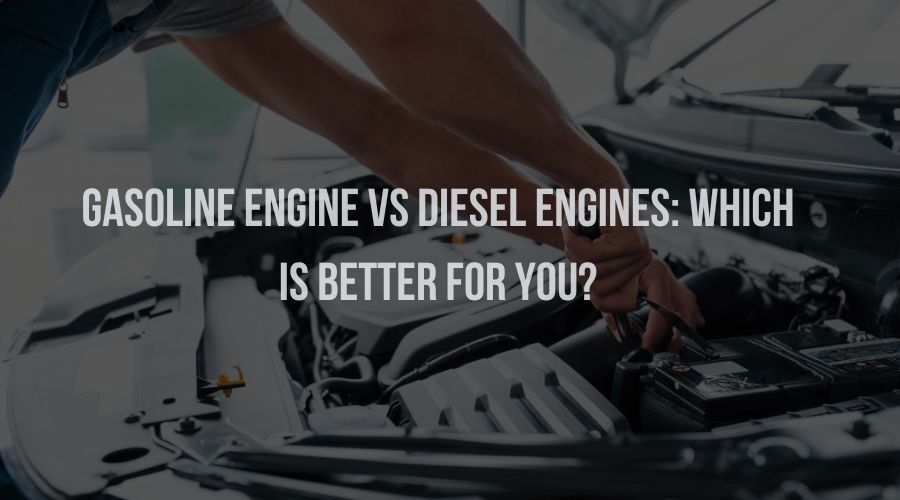When it comes to power tools, choosing the right engine can make all the difference. Whether you’re using a lawnmower, chainsaw, or generator, selecting between gasoline and diesel can be a tough decision. While both options have their benefits and drawbacks, the choice ultimately comes down to your specific needs and preferences. In this article, we’ll take a closer look at gasoline and diesel engines to help you make an informed decision on which is better for you.
Gasoline Engines
Gasoline engines are the most common type of engine used in power tools, and for good reason. They’re relatively inexpensive, easy to maintain, and offer excellent performance for most applications. Here are some of the advantages and disadvantages of gasoline engines:
Advantages
1. Cost-effective
Gasoline engines are generally less expensive than diesel engines. They’re also easier to maintain, which means that the overall cost of ownership is lower.
2. Lighter weight
Gasoline engines are typically lighter than diesel engines. This makes them ideal for use in portable power tools that need to be carried around.
3. Higher RPMs
Gasoline engines can typically run at higher RPMs(revolution per minute) than diesel engines. This makes them better suited for applications that require high-speed rotation.
Disadvantages
1. Lower torque
Gasoline engines typically have lower torque than diesel engines. This means that they may struggle with heavy loads or tough terrain.
2. Higher fuel consumption
Gasoline engines tend to have higher fuel consumption than diesel engines. This means that you may need to refill the fuel tank more frequently.
3. Less durable
Gasoline engines run on gas and are incredibly durable but have less durability than diesel engines. They may not last as long or perform as well under heavy use.
Diesel Engines
Diesel engines are less common in power tools than gasoline engines, but they have their own unique advantages. Here are some of the advantages and disadvantages of diesel engines:
Advantages
1. More torque
Diesel engines typically have higher torque than gasoline engines. This makes them better suited for heavy loads or tough terrain.
2. Better fuel economy
Diesel engines tend to have better fuel economy than gasoline engines. This means that you may be able to save money on fuel costs over time.
3. More durable
Diesel engines are typically more durable than gasoline engines. They may last longer and perform better under heavy use.
Disadvantages
1. Higher cost
Diesel engines are generally more expensive than gasoline engines. This means that the initial cost of ownership may be higher.
2. Heavier weight
Diesel engines are typically heavier than gasoline engines. This makes them less suitable for portable power tools.
3. Lower RPMs
Diesel engines can typically run at lower RPMs than gasoline engines. This makes them less suitable for applications that require high-speed rotation.
Which Engine is Better for You?
The choice between a gasoline engine and a diesel engine will depend on your specific needs and preferences. Here are some factors to consider when making your decision:
1. Purpose
What will you be using the power tool for? If you’ll be using it for heavy-duty applications, such as construction or farming, a diesel engine may be a better choice. If you’ll be using it for lighter applications, such as home DIY projects, a gasoline engine may be more appropriate.
2. Budget
How much are you willing to spend? Diesel engines are generally more expensive than gasoline engines, so you’ll need to factor this into your decision.
3. Portability
Will you need to move the power tool around frequently? If so, a gasoline engine may be a better choice, as they are generally lighter in weight than diesel engines.
4. Fuel economy
If fuel economy is a concern for you, a diesel engine may be a better choice, as they tend to have better fuel economy than gasoline engines.
5. Maintenance
Consider how much time and effort you’re willing to put into maintaining the engine. Gasoline engines are generally easier to maintain than diesel engines, so if you’re looking for a low-maintenance option, a gasoline engine may be the better choice.
Maximise your Workflow Potential with HRtools’ Solutions
When it comes to cutting wood, you need a tool that is powerful, reliable, and efficient. That’s why HRtools offers top-of-the-line gasoline chainsaws to meet your needs at a reasonable price range. Their inventory includes the high-performance Bose Power Gasoline Chain Saw 22” (Premium), featuring a powerful 58 CC engine that can handle heavy-duty cutting tasks with ease. With a 22-inch bar length and maximum cutting diameter of 22 inches, this saw is perfect for cutting thick logs and large branches. And that’s not all – we also offer the Tri-Circle Gasoline Chain Saw 62CC (6200), a professional-grade tool built to make quick work of even the most challenging cutting jobs. With its powerful 62 CC engine and 22-inch bar length, this saw is perfect for cutting through thick logs and large branches.
Conclusion
Both gasoline and diesel engines have their own advantages and disadvantages, and the choice between the two will depend on your specific needs and preferences. Consider factors such as purpose, budget, portability, fuel economy, and maintenance when making your decision, and choose the engine that best fits your needs. Whatever your choice may be, HRtools has the power tools for all your needs.
